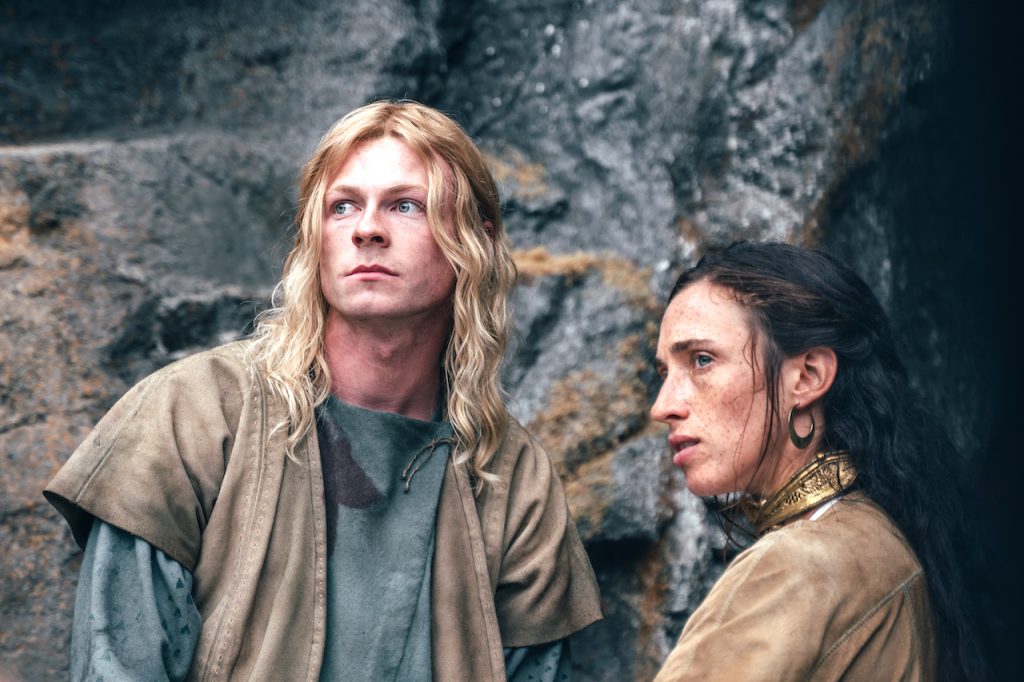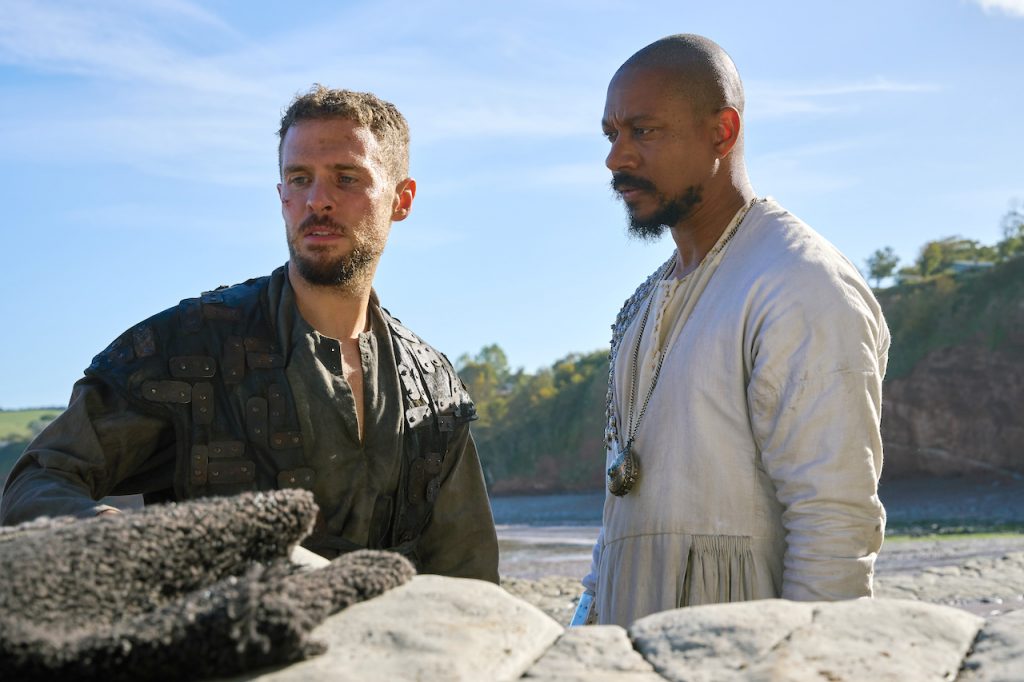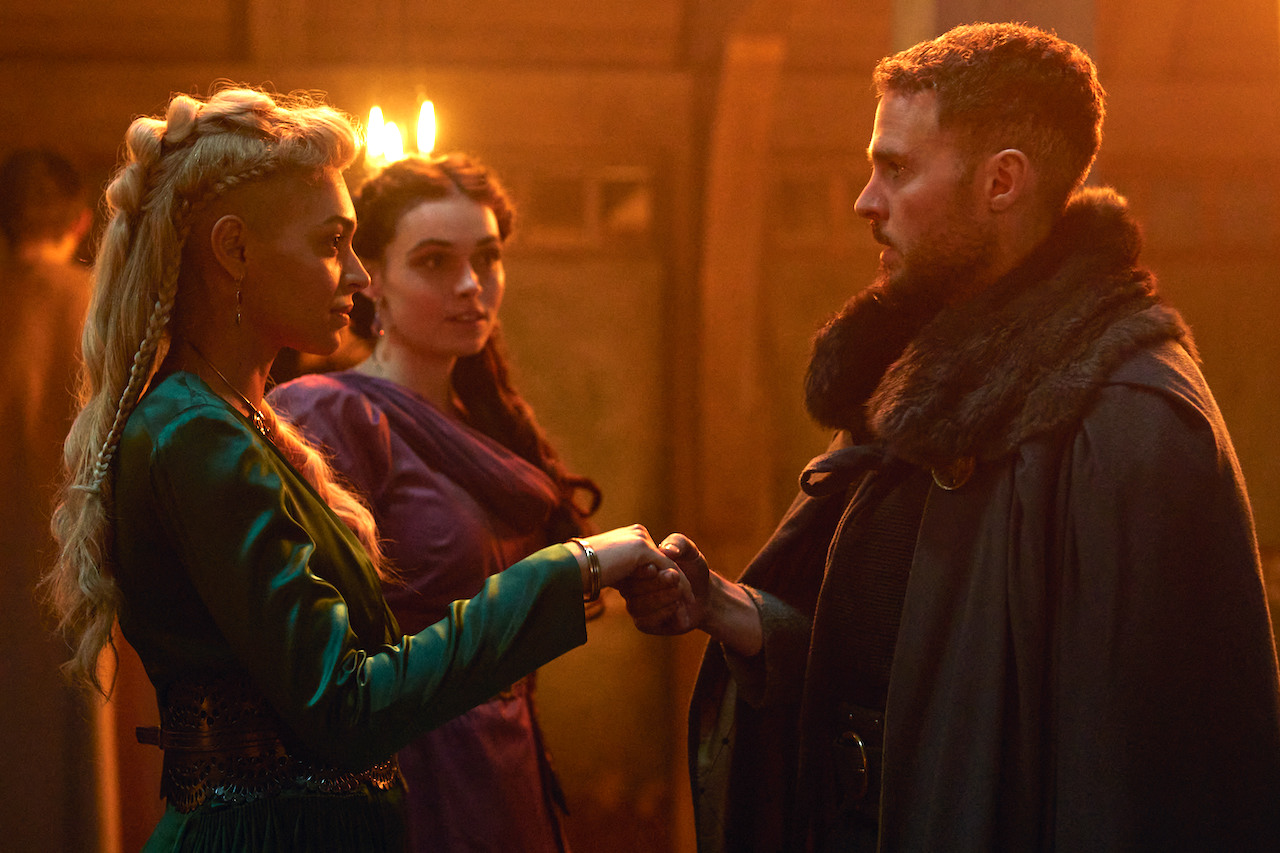It’s the latest take on a classic character. Based on author Bernard Cornwell’s Warlord Chronicles series, The Winter King revisits Arthurian legend with this series from Sony Pictures Television’s Bad Wolf. Written by Kate Brooke and Ed Whitmore, the series is designed to span several seasons and give more prominent voices to some of the traditionally lesser-known characters, putting a different spin on a well-known story.
Julie Gardner, executive producer of The Winter King, co-founded Bad Wolf with Jane Tranter in 2015 and during her lengthy career at BBC, headed the revival of Doctor Who in 2005. Colleague Lachlan MacKinnon also serves as executive producer on King and has overseen other Bad Wolf productions such as Industry and A Discovery of Witches. We spoke about this latest series, what the appeal was and their hopes for grounding a tale that has long been steeped in magic and mythology.
How did this project come to your attention?
Julie Gardner: I had wanted to do an Arthur series for a really long time. It’s a story I’m obsessed by. I’d read other source material and very happily for me, an American producer, Sherry Marsh, along with Shelley Browning and Kenneth Browning, had a shopping agreement on Bernard Cornwell’s novels. I had already read them, but I think I had checked them previously and they hadn’t been available.
As soon as they said they had them, I leapt forward. I was straight in because I love the novels. I thought there was a huge and brilliant foundation to build a world. And there was an obvious pace to the narrative where you could see a returning series across multiple seasons
In everything we do, even when we have to make inevitable changes, Bernard is the guiding light for everything that we’re doing. He’s one of the great historical fiction writers of our time. He realizes the world so brilliantly, but he also makes such smart choices and such unique choices in how he characterizes iconic roles. And also in the choice to tell the story from characters little known in the legend, such as Nimue. He focuses on other characters who are adjacent to the icons and have a commentary on them, which we thought was just a very smart choice.

Derfel (Stuart Campbell) & Nimue (Ellie James). Photo by Simon Ridgeway/ Bad Wolf
How involved was Bernard in the adaptation process? What was your vision for translating it from page to screen?
Julie Gardner: We work at Bad Wolf and we work with a lot of novelists. Some really want to be part of the process and others don’t. Bernard is very comfortable as a novelist, and he is very comfortable with his novels being optioned. And to give approval for the team to run with them. He’s not someone who is worrying about things like who you’ve cast and whether they’re five feet tall when they should be six feet tall and so on. He’s not really hands on in the way that some authors are really passionate to be.
But he’s a great cheerleader, so we did send him scripts and early cuts. We had conversations with his team. He came to the first table read that we did, which, because of the timing, was by Zoom, and that was an absolute privilege and a thrill. People were nervous! The writers were nervous because there was a real desire to do the right thing for him. We are all passionate about the work that he’s done.
Tell me about this version of Arthur’s character. What is his arc and what makes him unique in this particular telling of the story?
Lachlan MacKinnon: We’ve seen different guises of Arthur in so many different versions of the piece. But I think what Bernard’s done is go back to the way the books were written…in some ways, it’s his revisionist take because he’s seeing Arthur through the eyes of different characters. We’re able to reflect on who Arthur is as a human being as well as through Arthur’s eyes. So I think that’s the starting point for me, and what made it feel really fresh.
But the other part of it, which really changed it for me, was just how contemporary Arthur as a character felt. He was the one who wanted to find the new way to be a leader in the 5th century. It was such a revolutionary thought at that point. He was thinking, “We need a third way.” We’ve got the Saxons, we’re just on the shores and about to take over the Isle. And at the same time, other tribe kings are squabbling with each other. Instead of uniting against the Saxons, he was looking for another way.
I think that was something that felt particularly fresh to me, but was also very contemporary, given where the world is at in this day and age and what’s happening daily in the news. Kate Brooke and Ed Whitman were the writers, and with the material from Bernard as the North Star, that’s something that we all really wanted to tap into and explore. We also worked very closely with our director, Otto Bathurst, on shaping Arthur as a character and thinking about him, not only within the scope of season one, but also across the trilogy of novels that we would break down into five seasons.
Julie, you have experience with taking a legendary character that holds meaning for people and breathing new life into the storyline – particularly with your work on Doctor Who. How do you find that balance in paying tribute to a classic while making it fresh for a new audience or generation?
Julie Gardner: It’s really scary actually, because you know you can’t please everyone all of the time. In the case of The Winter King, you have to really try to identify – with all adaptations – what is the heart of what you are doing? Identify what is the principle to everything you’re doing and hold as firmly as you can to that core value. Then you understand that you will have to make changes.
In The Winter King, there are two substantial changes made in the first episode, one of which was to not have the voice over from the novels of elderly Derfel telling his story. I love that voice over in the novels. I think it adds texture and tone. It’s poetic, it’s elegiac, it’s absolutely beautiful. But we made the decision not to have that in the TV series because for the new audience that hasn’t read the novels, you don’t want them to think the character is safe and that we’re not going to kill him. So that when you’re telling a story about him going into his first fight, he’s not going to die. You don’t want an audience to be passively engaged in that thinking, “Oh, well, it’s going to be fine. He’s fine.” So we didn’t do that. It’s tonally a loss, but it’s the right thing, I believe, for the series as a whole as you’re trying to build out a world for television.

Arthur (Iain De Caestecker) & Merlin (Nathaniel Martello-White) Photo by Simon Ridgeway/ Bad Wolf
The second major thing we did was around the first appearance of Arthur. In the novels, he doesn’t appear until quite late in the narrative. We knew we needed to start earlier with him and made that decision to bring him into episode one, even though it’s a new dynamic and it’s a step away from the novels. The choice there was built from a line that Bernard has in his novels, which is almost a throwaway line, but which really registered with everyone on the team, “A ruler fears their male bastards and loves their female bastards.” Obviously you understand that’s about power and threat and it’s really interesting. We know there’s a crunchy relationship between Uther and Arthur, so let’s actually dramatize that. Let’s start from that place. That decision then really informs Arthur across the series because you’re then telling the story of a bastard who is exiled, who has to find his own way, who has to rebuild himself. Which then really plays into what we’re trying to do with Arthur and what I firmly believe Bernard was doing in the novels, which is to give new motivation to Arthur. Get behind the legend. What starts as a negative, which is a fight with his dad and an exile, hearing “you’re a bastard, you’ll never mean anything” actually becomes a positive for him. He is self-sufficient, he is independent, he has been an outsider. He comes to the process of building a country and protecting a country with different eyes. He sees things differently. So it becomes a huge advantage and that’s the story we want to tell, across many seasons.
To Lachlan’s point, the women characters in the novels are remarkable. They’re so vibrant and strong. Again, you’re not just seeing a label in a Guinevere or a Morgan, you’re seeing much, much more than that. In the novel, Morgan is burned, she’s got a face mask covering an injury. That’s something we may build to but we’re not starting there. Those are always the conversations – where do you start with these characters? When it comes to Derfel and Nimue, we started where the novels did. You’re on a journey with Nimue – she’s a girl rising into power as a high Pagan priestess. Derfel is a seemingly ordinary, every man’s orphan and you’re building across the novels to discover he’s way more than that and has an extraordinary back story. But with Arthur and some of the others, you’ve got to excavate.
From a filmmaking perspective, what do you like about this time period and what are some of the challenges?
Lachlan MacKinnon: There are plenty of challenges. The 5th century is such an unknown period. It’s called the Dark Ages for a reason. No one knows what really happened then, and there’s nothing that exists that is practical to filming any longer. We worked very closely with Professor Ronald Hutton, who’s an expert on the Dark Ages. Because it was such a long time ago, there are no paintings or remnants; nothing exists. It just involves some very deep detective work. And for each of the departments, because whether we’re talking about production design, costume… a lot of really deep research was involved. It was important that we landed because we wanted to make sure that this felt completely authentic and grounded.
Some of the other adaptations that have been made of the legends have been more medieval, which is so much easier because you can just go to a castle. But we had to build pretty much everything or be quite clever when it came to the balance of locations with some of the effects enhancement. That was something we felt was quite unique to the piece because it was grounded firmly in the 5th century, which you haven’t really seen that much of. You have to find the balance between it feeling very dark and dingy 5th century while capturing the beauty as well. Yes, there are battles, but at the same time there are big love stories that play across the piece.
So I think when it came to the challenges, we tried to turn them into positives. We had such a great creative team and everyone was really focused on making sure that we could direct the resources we had in the right way. Kate Brooke and Ed Whitmore are wonderful writers and balanced the tone and pace of the episodes as well as the “epicness” in scale of what we see versus some of the more intimate moments.
Julie Gardner: What we were trying to do is ground the world, but give it a beauty so you understand why characters are prepared to fight for it. But reality also sets in…we started filming in July and shot for thirty weeks in the West of England and Wales. We didn’t wrap until well into January. So you can imagine where the weather took us by that point! There was definitely one sequence where we were surrounded by mud and I wondered what we were thinking. Sometimes you have to live with things where it’s the weather that does you in.
Tell me about Bad Wolf. What are some of the things you look for in the scripts that come across your desk?
Julie Gardner: We live for our relationships with writers. We’re nothing without the writers. I mean nothing.
So having said that, you just look for commitment on the page. Obviously, what is good writing? We could debate that for days, but you can always tell. It’s the realization of the world. It’s the characters, it’s the choices that people make. There is a lot to talk about here because there are a lot of choices that can be made. As much as we all have a voice, Lachlan, myself or the other producers, you’re really trying to hang on to your writers and what excites them to write. As one example, how you realize magic in the piece was something that was long debated. Are we the kind of show with sword and sorcery or what? That was a discussion that the writers led on, and you find a place where you can give a little bit of magic, a little bit of the epic, but you’re grounding. So that’s a team effort, but of course it comes from the voices of the writers.
Lachlan MacKinnon: I would add to not prejudge us either. I think a lot of people come to Bad Wolf thinking, “Oh, you’re the guys that do A Discovery of Witches and Doctor Who” and so on. We do, but we also make shows like I Hate Suzie and Industry which are both contemporary pieces. So there is a whole range of projects that we’re interested in.

